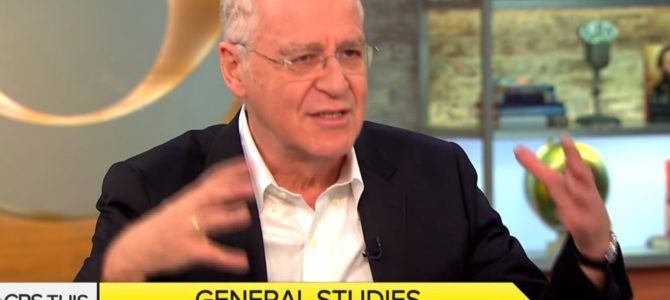
It turns out the battle over Jim Acosta’s White House press pass isn’t the only reason many Americans no longer take the national media seriously. The attention the media gave the story about who will be speaking at next year’s White House Correspondents Dinner is yet another reminder that the press needs to get over itself.
That isn’t to say that the announcement that historian Ron Chernow will keynote the next annual White House Correspondents Association dinner isn’t newsworthy. The so-called “nerd prom” has become one of the most talked-about events in the capital every year. Rather than an evening in which journalists and the government they cover could gather to celebrate the First Amendment and to have a laugh at each other’s expense, the dinner has become a symbol of everything that’s wrong with the media.
In the last two decades, the event became a magnet for Hollywood celebrities. There’s nothing wrong with that, but in embracing the dubious notion that those who cover the White House and Washington politics aren’t the working press but another type of celebrity in a culture that venerates notoriety for its own sake, the dinner — although insignificant in itself — is part of the process by which we have arrived at the current dismal state of journalism in the 21st century.
There is nothing entirely new about the idea of journalism as show business. That’s a game star reporters played as far back as the 19th century. But it accelerated as television became the main source of news for most Americans. The difference in the era in which staid figures such as Walter Cronkite, Harry Reasoner, Chet Huntley, and David Brinkley dominated television news is that all of them adhered to the notion that their calling required its practitioners to assume an attitude of objectivity and to refrain from editorializing while delivering news.
That pose of objectivity was always something of a pretense, since the mainstream media in that era was dominated by political liberals — like Cronkite — who did tilt coverage in the direction of their pet causes and politicians. But even their most prejudiced efforts were relatively restrained and delivered in a manner that still paid homage to the imperative to give the public straight news coverage untainted by overt bias.
The arrival of cable opened up opportunities for diverse views that had been suppressed in an era when television news consisted solely of half-hour evening shows on the broadcast networks. The advent of 24/7 cable news networks and Fox News’ conscious efforts to offer a voice to heretofore-marginalized conservative perspectives made it clear that all of the networks were biased in their own way.
The blurring of the lines between news and opinion was also furthered by the advent of daily cable comedy shows that focused on satirizing news events. While liberals no longer had a monopoly on news shows, they made it up for by dominating comedy. The “Daily Show” on Comedy Central institutionalized a trend that spread to mainstream comedy and variety shows by which the once bipartisan nature of comic sketches on late-night television was transformed into a regular in-kind contribution to the Democratic Party.
That didn’t necessarily affect the way the vast majority of Washington reporters went about their work of covering the government. But it is impossible to ignore the connection between the increased interest in the WHCA dinner and how many in the press have started to behave as if they were working for partisan snickers rather than reporting the news.
Even if we set aside the faux glamour of the dinner where journalists dressed up like the celebrities who flocked to the event, the real connection to the change in the way news was delivered to the public was the “roast” element in which most of the dinners were keynoted by a comedian who would skewer every available conservative or Republican target. While tradition dictated that the president of the United States would also speak and deliver something of a comic riposte to the comedian, the notion of the event allowing both the press and those it covered to socialize and to poke gentle fun at each other has long since been lost as politicized satire grew more vicious.
The main problem was that the consistently biased nature of that element of the dinner — ostensibly held to raise funds for journalism scholarships — and its emphasis on seeing and being seen had turned the event into political theater, not an annual cease-fire. Under those circumstances, it was little surprise that President Donald Trump (whose run for president was supposedly spurred by the roasting he got at the dinner in 2012 at the hands of both comedian Seth Myers and President Barack Obama) chose not to attend the first two of his presidency.
The 2018 edition of the dinner was the climax of this trend when comedian Michelle Wolf’s attack on the Trump administration — and the personal appearance of White House spokeswoman Sarah Huckabee Sanders — erased any notion that the event was anything but an opportunity for the worst sort of cruel jibes at the expense of Trump and Republicans rather than anything that might be considered satire.
Given the blowback from that awful evening, it is little surprise that the WHCA is seeking to step away from the brink and, for the first time in 15 years, has invited someone other than a comedian to keynote their dinner. In doing so, they’ve chosen wisely in selecting Chernow instead of a comic. His award-winning biographies of Alexander Hamilton, George Washington, and Ulysses Grant as well as his books on the financial industry bring a certain gravitas to the event, even if his status as the man whose book inspired Lin Manuel Miranda’s Broadway musical mega hit about first secretary of the treasury adds an element of celebrity to his role as historian.
Chernow can be expected, as he promised, to deliver a stern defense of a free press and the First Amendment. That won’t inspire the kind of controversies the comedians have supplied. While Wolf denounced the switch as a form of cowardice, at least the WHCA board understands that after this year’s dinner, it wasn’t possible any longer to blame Trump for the decline in civility or the coarsening of our communal discourse.
But the problem goes deeper than whether someone who can put our current controversies into perspective replaces a sleazy comic. It’s that the show biz aspect of the event has infected the way some prominent members of the press go about their work. It’s also impossible to separate the antics of Acosta at White House pressers from what has become of the WHCA dinner. Due to the White House’s heavy-handed response to Acosta, in some quarters the CNN star is viewed as a newly minted martyr for a free press under attack.
Trump’s willingness to push back against a biased media in ways that are counter-productive and to use language that is reminiscent of undemocratic societies, such as calling his press critics “enemies of the people,” is misguided. But the actions that pushed the White House to suspend Acosta’s press pass reflect the same values that turned the WHCA dinner into a bad joke.
A free press is vital to American democracy. But Acosta’s brazen use of White House pressers to debate the administration and give what amount to critical speeches directed at the president and even his refusal to give up the microphone after already asking several questions, is more in keeping with the behavior of late-night comic and celebrity roasters than a journalist. His erasing of the line between news and opinion demonstrates not merely open partisanship but a fundamental decline of professionalism and the values of good journalism.
While some may excuse his behavior, because Trump also breaks the rules, it is impossible to understand his stunts outside of the context of the same dysfunctional journalistic culture that thought Michelle Wolf was an appropriate keynoter for the WHCA dinner.
In that sense, it will take a lot more than a speech by Chernow to save an institution that may be irreparably harmed by the virus of celebrity. But it is not too late for journalists to step back and see where this has taken us and how important it is for even the most partisan among us to understand the damage that the culture that produced this nerd prom is doing to the public’s trust in the media.









